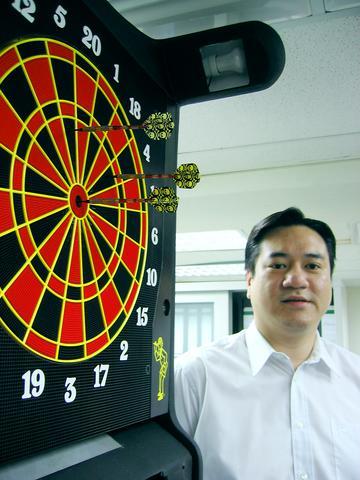As the nation continues to lament its lack of outstanding sports personalities, the Chinese Taipei Darts Association (
The association was established just over a year ago and was, until recently, based out of the Kaohsiung offices of its chairman, Huang Tien-huang (
In a bid to fuel interest in darts and create a national darts league to eventually field a national team at international events, the association opened a Taipei bureau in May this year. While many local pub teams meet for social competitions -- there are 10 such teams in the Tianmu area alone -- a national squad hasn't competed on the international circuit for almost a decade.

PHOTO: GAVIN PHIPPS, TAIPEI TIMES
Organized by the long-disbanded Taipei Darts League, the Taiwanese team was once a regular participant in the biennial Asia Cup and numerous other competitions throughout Asia. Lack of sponsorship deals and financial backing, however, finally put an end to the national squad.
"We used to go to Hong Kong, Singapore, Japan and all over Asia to compete in competitions and did quite well," recalled Jack Wang (
The new Taipei office, which is headed by the darts association's vice chairman, Hong Kong-born Tony Kuo (
Kuo is also holding negotiations with cable sports networks about the possibility of broadcasting future competitions. While TV deals and government assistance are still up in the air, the association has already enjoyed a modicum of success. Since opening in Taipei, the association's roster has jumped to over 150 members.
"We've seen some success, but we've still got a long way to go. The average person still thinks of [darts] as a game to play in the pub," said Kuo. "Because of this we're not just promoting it as a competitive sport and with the help of the city government, we are also promoting darts as a form of exercise and a game the whole family can enjoy."
The association has received verbal support from the Taipei City Government along with sponsorship deals from a couple of local newspapers and has also enlisted help from popular soap-opera stars Chang Yuen-chang (
While Wang remains hopeful of one day seeing a Taiwanese team return to the international darts circuit, he is somewhat skeptical of the tiny under-funded association's ability to maintain a high enough profile to carry out its goals.
"It's always been a question of money rather than that of finding talent able to compete abroad. There are a lot good players in Taiwan, but few people willing to back a team financially," said Wang. "The creation of a fully functioning national league will take at least one or two years."
The association held its first officially sanctioned Taipei darts competition last month, and while the turnout was still meager, participation was larger then Kuo initially anticipated. The two-day 2004 Taipei International Darts Carnival (
"We didn't expect to see a massive turnout, but with 200 people coming to play on both days of the competition I'd have to say it was a success," he said. Plans have already been drawn up for a competition in Kaohsiung in September and a first national competition will be held in December.
The December competition, the 2004 National Dart Tournament (

“Why does Taiwan identity decline?”a group of researchers lead by University of Nevada political scientist Austin Wang (王宏恩) asked in a recent paper. After all, it is not difficult to explain the rise in Taiwanese identity after the early 1990s. But no model predicted its decline during the 2016-2018 period, they say. After testing various alternative explanations, Wang et al argue that the fall-off in Taiwanese identity during that period is related to voter hedging based on the performance of the Democratic Progressive Party (DPP). Since the DPP is perceived as the guardian of Taiwan identity, when it performs well,

The Taiwan People’s Party (TPP) on May 18 held a rally in Taichung to mark the anniversary of President William Lai’s (賴清德) inauguration on May 20. The title of the rally could be loosely translated to “May 18 recall fraudulent goods” (518退貨ㄌㄨㄚˋ!). Unlike in English, where the terms are the same, “recall” (退貨) in this context refers to product recalls due to damaged, defective or fraudulent merchandise, not the political recalls (罷免) currently dominating the headlines. I attended the rally to determine if the impression was correct that the TPP under party Chairman Huang Kuo-Chang (黃國昌) had little of a

At Computex 2025, Nvidia CEO Jensen Huang (黃仁勳) urged the government to subsidize AI. “All schools in Taiwan must integrate AI into their curricula,” he declared. A few months earlier, he said, “If I were a student today, I’d immediately start using tools like ChatGPT, Gemini Pro and Grok to learn, write and accelerate my thinking.” Huang sees the AI-bullet train leaving the station. And as one of its drivers, he’s worried about youth not getting on board — bad for their careers, and bad for his workforce. As a semiconductor supply-chain powerhouse and AI hub wannabe, Taiwan is seeing

Jade Mountain (玉山) — Taiwan’s highest peak — is the ultimate goal for those attempting a through-hike of the Mountains to Sea National Greenway (山海圳國家綠道), and that’s precisely where we’re headed in this final installment of a quartet of articles covering the Greenway. Picking up the trail at the Tsou tribal villages of Dabang and Tefuye, it’s worth stocking up on provisions before setting off, since — aside from the scant offerings available on the mountain’s Dongpu Lodge (東埔山莊) and Paiyun Lodge’s (排雲山莊) meal service — there’s nowhere to get food from here on out. TEFUYE HISTORIC TRAIL The journey recommences with